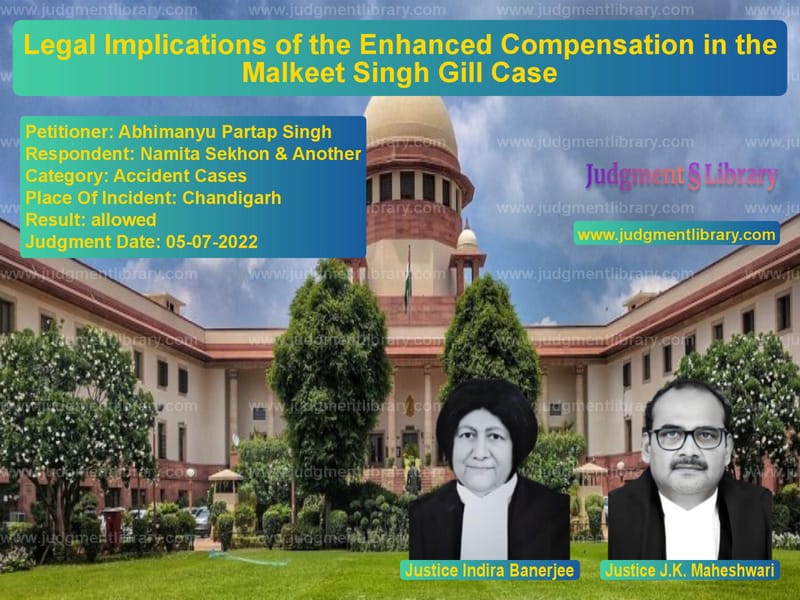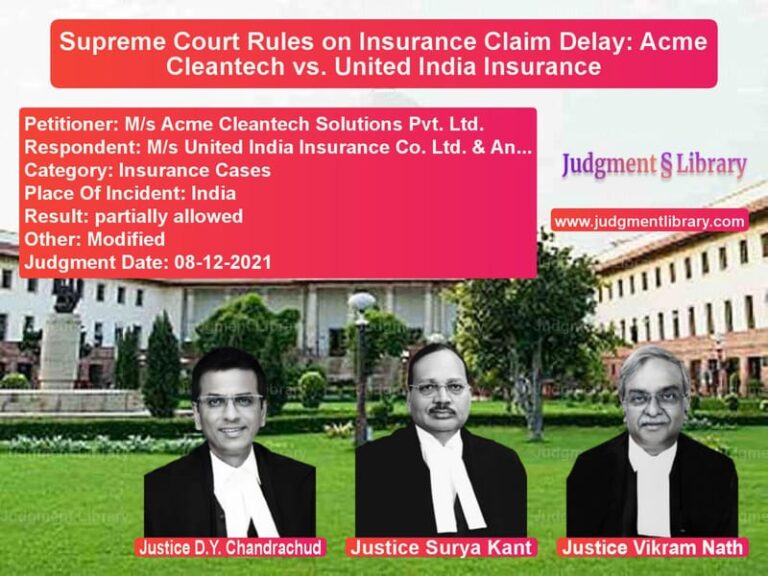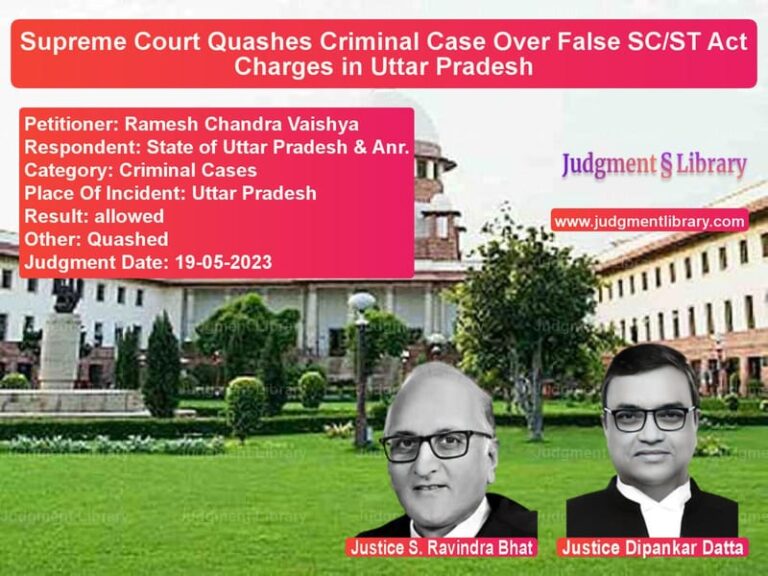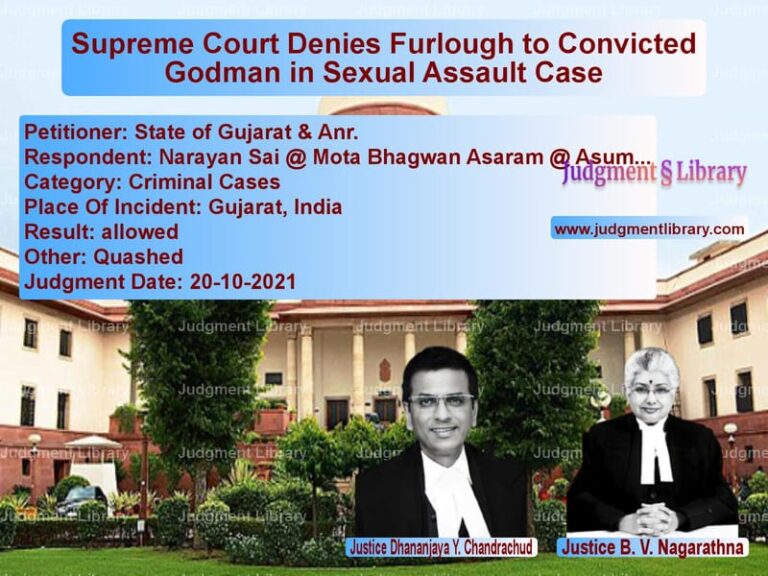Legal Implications of the Enhanced Compensation in the Malkeet Singh Gill Case
This case revolves around a tragic road accident that left the claimant, a minor child, with permanent and debilitating disabilities. The appeal addresses the adequacy of the compensation awarded by the Motor Accident Claims Tribunal (MACT) and its enhancement by the High Court. The appellant, who was just five and a half years old at the time of the accident, was rendered 100% disabled due to the injuries sustained. The case delves into the legal and medical complexities involved in determining fair compensation for a child whose life was drastically altered due to the injuries sustained in a road accident. The discussion also focuses on the principles of compensation for personal injury, particularly in cases involving long-term disability.
Background of the Case
The claimant, Malkeet Singh Gill, was a five-and-a-half-year-old child at the time of the road accident that took place on November 10, 1996. He suffered multiple severe injuries, including cerebral edema, a fracture of the right temporal bone, spinal cord injury, and lower limb paralysis. These injuries left him with a 100% permanent disability, including the loss of speech, the need for constant medical attention, and the inability to perform basic bodily functions without assistance.
Read also: https://judgmentlibrary.com/motor-accident-compensation-supreme-court-restores-tribunal-award/
The claimant’s parents were professionals with the father being a professor and the mother an IAS officer. The appellant had aspirations of becoming an executive or an IAS officer like his parents, but the accident shattered these dreams. As a result, the child was deprived of his normal developmental potential, and his future, once bright, was left uncertain.
The MACT awarded compensation of Rs. 9,00,000, which was later enhanced by the High Court to Rs. 23,20,000. However, the claimant sought further enhancement, arguing that the compensation was not sufficient considering the gravity of his permanent disability. He filed the current appeal to seek a further increase in the awarded compensation.
Legal Issues in the Case
- Was the compensation granted by the MACT and enhanced by the High Court adequate in light of the claimant’s permanent disability?
- Should the future loss of earnings be calculated based on the claimant’s entire lifetime or only for a limited number of years?
- What is the appropriate method for calculating the cost of medical treatment, attendant charges, and future care for a child with 100% disability?
- How should non-pecuniary damages such as pain, suffering, and loss of amenities be evaluated and compensated?
Arguments by the Petitioner (Malkeet Singh Gill)
- The petitioner argued that the compensation awarded was grossly inadequate considering the severity of the claimant’s injuries and the long-term nature of his disability.
- The petitioner contended that the calculation for future loss of earnings was inadequate, as the claimant would be unable to lead a normal life and pursue a career.
- The petitioner also argued that the compensation for attendant charges and medical expenses should reflect the claimant’s lifelong need for assistance and care.
- The petitioner further emphasized that the claimant’s aspirations and bright future, as a child of highly educated parents, had been lost due to the accident, warranting a higher award for loss of amenities and future expectations of life.
Arguments by the Respondent (State of Chhattisgarh and Insurance Company)
- The respondent, represented by the insurance company, argued that the compensation awarded by the High Court was adequate and consistent with the principles of compensation under the Motor Vehicles Act.
- The respondent contended that the appellant had already received a substantial amount, and the future loss of earnings had been fairly calculated considering the claimant’s ability to work as an advocate despite his disability.
- The respondent also defended the decision to limit the compensation for attendant charges to a period of 20 years, arguing that this was a reasonable duration considering the claimant’s age at the time of the accident.
Supreme Court’s Observations
- The Court observed that the claimant had suffered a devastating and permanent disability due to the accident, which affected his physical and mental faculties. The Court noted that this had a profound impact on the claimant’s ability to lead a normal life.
- The Court emphasized the importance of considering the long-term nature of the disability while calculating compensation, particularly in cases involving children who are deprived of their future potential.
- The Court recognized the need for compensation to reflect not only the pecuniary losses but also the non-pecuniary damages, including pain, suffering, loss of amenities of life, and loss of future prospects.
- The Court noted that the High Court’s calculation of the future loss of earnings for only 10 years was inadequate, considering that the disability was permanent and lifelong. The Court determined that the multiplier method should be applied, considering the claimant’s life expectancy.
The Court ruled:
“Considering the nature of the claimant’s permanent disability and the need for lifelong care, the compensation awarded by the High Court is enhanced. The future loss of earnings is calculated applying a multiplier of 18, and the total compensation is increased to Rs. 51,62,000.”
Final Judgment
The Supreme Court issued the following directives:
- The compensation for future loss of earnings is calculated to be Rs. 10,80,000, applying the multiplier of 18.
- The compensation for attendant charges is enhanced to Rs. 21,60,000, based on a monthly amount of Rs. 10,000 for 24-hour care.
- The Court increased the compensation for medical expenses, physiotherapy, and transportation to Rs. 11,72,000.
- The Court enhanced the non-pecuniary damages, awarding Rs. 5,00,000 for pain, suffering, and loss of amenities.
- The total compensation is now Rs. 51,62,000, which is Rs. 28,42,000 more than what was awarded by the High Court.
- The enhanced compensation shall carry interest at the rate of 6.5% per annum from the date of filing the claim petition until its realization.
Implications of the Judgment
- The ruling emphasizes the need for a fair and just calculation of compensation, particularly in cases involving permanent disabilities, where the victim’s life and future are severely impacted.
- The decision highlights the importance of applying a reasonable multiplier to determine the future loss of earnings and the necessity of covering lifelong medical and attendant care costs.
- The judgment reinforces the need for courts to consider both pecuniary and non-pecuniary damages to provide comprehensive compensation to victims of road accidents and personal injuries.
- This case serves as a critical precedent for future cases involving catastrophic injuries and the appropriate calculation of compensation under the Motor Vehicles Act.
The Court’s judgment in this case demonstrates a balanced approach to justice, ensuring that victims of road accidents are compensated adequately for the life-altering consequences of their injuries.
Petitioner Name: Abhimanyu Partap Singh.Respondent Name: Namita Sekhon & Another.Judgment By: Justice Indira Banerjee, Justice J.K. Maheshwari.Place Of Incident: Chandigarh.Judgment Date: 05-07-2022.
Don’t miss out on the full details! Download the complete judgment in PDF format below and gain valuable insights instantly!
Download Judgment: abhimanyu-partap-sin-vs-namita-sekhon-&-anot-supreme-court-of-india-judgment-dated-05-07-2022.pdf
Directly Download Judgment: Directly download this Judgment
See all petitions in Road Accident Cases
See all petitions in Compensation Disputes
See all petitions in Motor Vehicle Act
See all petitions in Negligence Claims
See all petitions in Judgment by Indira Banerjee
See all petitions in Judgment by J.K. Maheshwari
See all petitions in allowed
See all petitions in supreme court of India judgments July 2022
See all petitions in 2022 judgments
See all posts in Accident Cases Category
See all allowed petitions in Accident Cases Category
See all Dismissed petitions in Accident Cases Category
See all partially allowed petitions in Accident Cases Category







